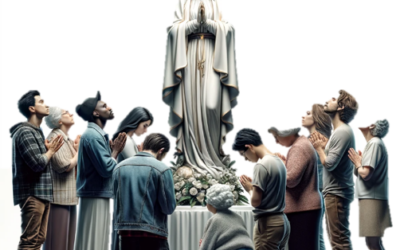One of the things Roman Catholics assert is that Protestant teachings are not found in the early church. But, that’s not true. They are found in the early church. In fact, they are found in the earliest church, the Church of the New Testament. But, Roman Catholics routinely say that the early church was comprised of the church fathers and that they all held to Catholic teachings. That’s not true since the church fathers contradict each other on many topics: Early Church Fathers Quotes by Topic.
But, if we are to look at the early church to see if Protestants’ teachings are present, then let’s do that. Let’s look at the early church. Where is the early church? It is first found in the New Testament. That is where the early church began. In the book of Acts, we have the first mention of Christians (Acts 11:26; 26:28). It is the book of Acts that records the first Christian practices and beliefs. In addition, the New Testament epistles mention Christians and their teachings. All anyone has to do is read them to find what the early church believed and practiced.
Of course, the word Protestant is not in the New Testament, and Protestants didn’t exist as a movement until the 1500s. But, Protestants claim to find their teachings in the New Testament. So, that’s what we need to look at. We need to see if Protestant ideas are found in the earliest church, the New Testament Church. But, why is that? Why do we put so much emphasis on Scripture over and above the church’s sacred tradition?
Apostasy and the early church
One of the things I say to Catholics (and those in the Orthodox Church) is that the church fathers often contradicted themselves and each other. They are not and should not be the final authority of doctrinal truth. And, they are not the ones we should look to in order to interpret Scripture. We should look to God’s word for that. But that’s another topic. Nevertheless, the New Testament is inspired, not the church fathers.
The New Testament epistles were written to counter the errors already creeping in the church – while the apostles were still alive. How much more do you think other errors will creep into the church after the death of the apostles? Paul, the apostle, warned us about that exact thing.
“I know that after my departure savage wolves will come in among you, not sparing the flock; 30 and from among your own selves men will arise, speaking perverse things, to draw away the disciples after them,” (Acts 20:29–30).
Now, I am not saying the church fathers were wolves in sheep’s clothing. Not at all. Many of them had if a lot of good things to say and were very insightful. But, a lot of them held to some pretty strange views on lots of different topics. They were, after all, not inspired.
What are Protestant teachings?
Alright, so what exactly are Protestant teachings? Quite simply, they are teachings that are found in Scripture and that stand against the errors of Roman Catholic teachings. To be clear, both Protestants and Catholics agree on the doctrine of the Trinity, the two natures of Jesus, and Christ’s physical resurrection, etc. But the things they differ on, that relate to Protestant theology are listed below. And, please notice, I have listed those differences with Scripture references. This is to demonstrate that the early church did hold to so-called Protestant ideas. Or I should say, the Protestants hold to the teachings of the early church.
The Protestants affirmed Scripture and derived out of it, those things that stood in opposition to Roman Catholic teachings. Therefore, they became “Protestant” distinctives. But, are they biblical? Were they taught and believed by the earliest church recorded in the New Testament? Yes, they were.
- One mediator between God and man, not many mediators (1 Tim. 2:5)
- Justification by faith alone, not by faith and works, or baptism (Rom. 3:28; 4:5; 11:6; Gal. 2:16, 21)
- Eternal Security, not conditional security based on our works (John 6:37-40; 10:27-28)
- We are allowed to have differences of opinions on debatable issues, but not the essentials (Rom. 14:1-5)
- Scripture is the final authority spiritual matters, not tradition and church councils (Acts 17:11; 2 Tim. 3:15-16)
- The priesthood of all believers, not just the Catholic clergy (1 Peter 2:5)
- Christ was sacrificed only once for believers, not repeatedly in the Mass (Heb. 9:28; 1 Peter 3:18)
- Grace is God’s unmerited favor and work of God in a person, not something infused through sacraments (Acts 18:27; Rom. 3:24; 6:14; 11:6).
As you can see, Protestant theology is certainly taught in the earliest church. We know this from what the Scriptures say was taught and practiced.
Scripture and the Early Church
To assist you in reading this article, I have reproduced the list above and inserted the Scriptures. Remember, the apostles were part of the earliest church and they have written what the early church was to believe and practice.
- One mediator between God and man, not many mediators (1 Tim. 2:5)
- 1 Timothy 2:5, “For there is one God, and one mediator also between God and men, the man Christ Jesus,”
- Justification by faith alone, not by faith and works, or baptism (Rom. 3:28; 4:5; 11:6; Gal. 2:16, 21)
- Romans 3:28, “For we maintain that a man is justified by faith apart from works of the Law.”
- Romans 4:5, “But to the one who does not work, but believes in Him who justifies the ungodly, his faith is credited as righteousness.”
- Romans 11:6, “But if it is by grace, it is no longer on the basis of works, otherwise grace is no longer grace.”
- Galatians 2:16, “nevertheless knowing that a man is not justified by the works of the Law but through faith in Christ Jesus, even we have believed in Christ Jesus, so that we may be justified by faith in Christ and not by the works of the Law; since by the works of the Law no flesh will be justified.”
- Galatians 2:21, “I do not nullify the grace of God, for if righteousness comes through the Law, then Christ died needlessly.”
- Eternal Security, not conditional security based on our works (John 6:37-40; 10:27-28)
- John 6:37–40, “All that the Father gives Me will come to Me, and the one who comes to Me I will certainly not cast out. 38 For I have come down from heaven, not to do My own will, but the will of Him who sent Me. 39 This is the will of Him who sent Me, that of all that He has given Me I lose nothing, but raise it up on the last day. 40 For this is the will of My Father, that everyone who beholds the Son and believes in Him will have eternal life, and I Myself will raise him up on the last day.”
- John 10:27–28, “My sheep hear My voice, and I know them, and they follow Me; 28 and I give eternal life to them, and they will never perish, and no one will snatch them out of My hand.”
- We are allowed to have differences of opinions on debatable issues, but not the essentials (Rom. 14:1-5)
- Romans 14:1–5, “Now accept the one who is weak in faith, but not for the purpose of passing judgment on his opinions. 2 One person has faith that he may eat all things, but he who is weak eats vegetables only. 3 The one who eats is not to regard with contempt the one who does not eat, and the one who does not eat is not to judge the one who eats, for God has accepted him. 4 Who are you to judge the servant of another? To his own master, he stands or falls; and he will stand, for the Lord is able to make him stand. 5 One person regards one day above another, another regards every day alike. Each person must be fully convinced in his own mind.”
- Scripture is the final authority spiritual matters, not tradition and church councils (Acts 17:11; 2 Tim. 3:15-16)
- Acts 17:11, “Now these were more noble-minded than those in Thessalonica, for they received the word with great eagerness, examining the Scriptures daily to see whether these things were so.”
- 2 Timothy 3:15–16, “and that from childhood you have known the sacred writings which are able to give you the wisdom that leads to salvation through faith which is in Christ Jesus. 16 All Scripture is inspired by God and profitable for teaching, for reproof, for correction, for training in righteousness;”
- The priesthood of all believers, not just the Catholic clergy (1 Peter 2:5)
- 1 Peter 2:5, “you also, as living stones, are being built up as a spiritual house for a holy priesthood, to offer up spiritual sacrifices acceptable to God through Jesus Christ.”
- Christ was sacrificed only once for believers, not repeatedly in the Mass (Heb. 9:28; 1 Peter 3:18)
- Hebrews 9:28, “so Christ also, having been offered once to bear the sins of many, will appear a second time for salvation without reference to sin, to those who eagerly await Him.”
- 1 Peter 3:18, “For Christ also died for sins once for all, the just for the unjust, so that He might bring us to God, having been put to death in the flesh, but made alive in the spirit;”
- Grace is God’s unmerited favor and work of God in a person, not something infused through sacraments (Acts 18:27; Rom. 3:24; 6:14; 11:6).
- Acts 18:27, “And when he wanted to go across to Achaia, the brethren encouraged him and wrote to the disciples to welcome him; and when he had arrived, he greatly helped those who had believed through grace.”
- Romans 3:24, “being justified as a gift by His grace through the redemption which is in Christ Jesus;”
- Romans 6:14, “For sin shall not be master over you, for you are not under law but under grace.”
- Romans 11:6, “But if it is by grace, it is no longer on the basis of works, otherwise grace is no longer grace.”
Conclusion
The Scriptures are the final authority of truth, not the church fathers, and certainly not church tradition. The Roman Catholic church claims to possess the authority to reveal God’s truth, to interpret God’s word, and to decide which “sacred tradition” is authentic. In spite of that, we must realize that the earliest church held to so-called Protestant teachings and not the Catholic additions which have been imposed into and upon God’s word. So, yes, Protestant teachings are found in God’s word.





